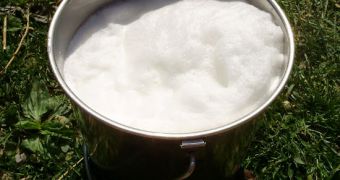The news has just broken that, after analyzing the make-up of as many as 1,500 bulk milk samples collected from various regions of the United Kingdom, researchers have found that some of them were contaminated with MRSA ST398, a superbug strain that can prove fatal to humans.
Thus, seven bulk milk samples coming from five farms in England, Scotland and Wales contained this superbug.
Commenting on these findings, Dr Mark Holmes stated that, “Until this discovery it was always assumed that this form of livestock MRSA was a problem on the Continent, but it has now jumped the Channel.”
“It now seems that it is established in this country – perhaps one in every 200 farms,” he wished to emphasize.
Due to the fact that the MRSA ST398 typically gets destroyed when milk is heated in order to be pasteurized, these findings should not stir all that many concerns.
However, the fact remains that some people prefer to eat unpasteurized milk and/or cheese on account of their tasting better or being healthier.
This means that they could end up ingesting this superbug, and soon enough find that they are suffering with a potentially deadly infection.
Moreover, the specialists who made this discovery wish to draw attention to the fact that farm workers can easily come in contact with this superbug and later on pass it on to other individuals.
The problem with the MRSA ST398 is that it is resistant to antibiotics, simply because it is the result of people's stuffing livestock with antibiotics itself, Daily Mail explains.
Therefore, treating those who become exposed to it is a fairly difficult thing to do.
For the time being, both the country's Soil Association and several farmers are asking that high officials launch a nation-wide investigation whose goal would be that of determining the precise spread of this superbug.
Besides this, they ask that farmers cut down on the amounts of antibiotics they use to treat livestock.

 14 DAY TRIAL //
14 DAY TRIAL //